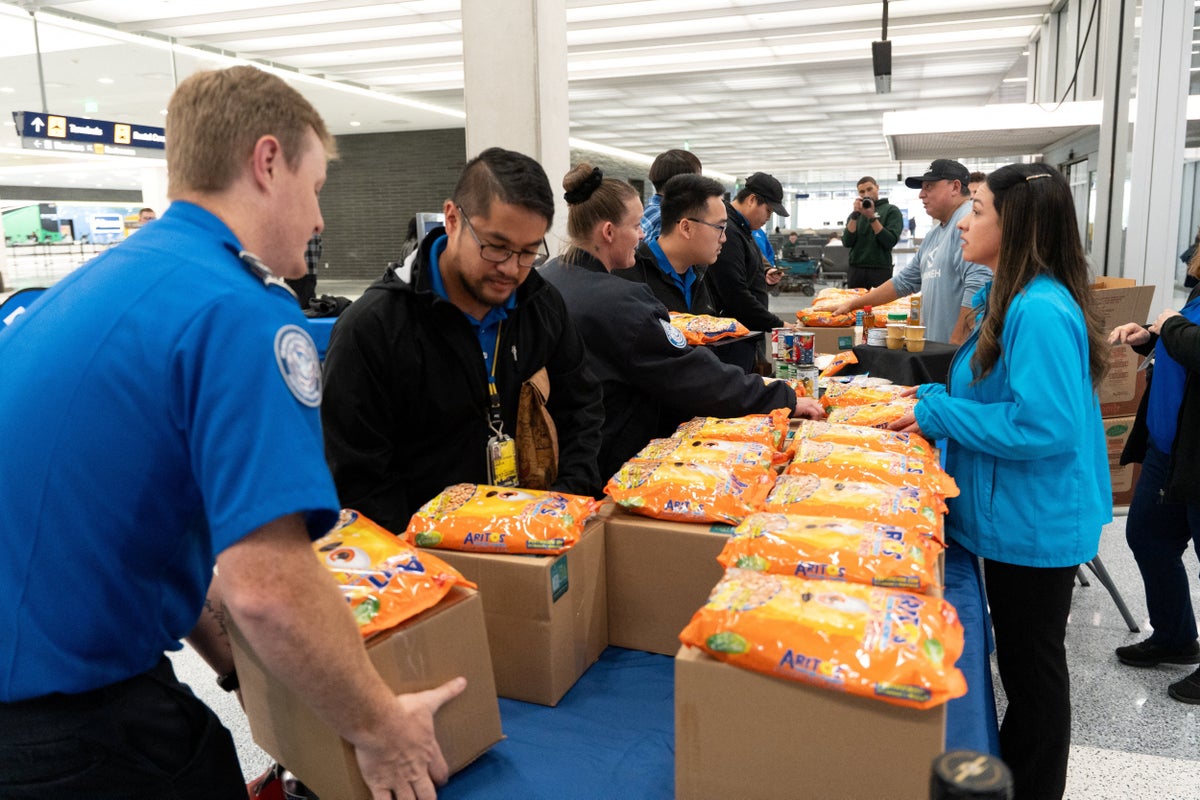
Federal airline employees missed their first paycheck this week as the government shutdown steers toward the longest-ever in U.S. history.
Air traffic controllers, Transportation Security Administration employees and other unpaid federal aviation workers remain on the job as essential workers, without pay, as members of Congress remain at an impasse over a budget bill to keep the government running.
Several major airlines and community food banks are now stepping in to help feed essential airport employees during the stalemate.
American, Delta, JetBlue and United airlines, among others, are providing meals at airports across the country. “We appreciate the hardworking federal employees who are keeping the air travel system running,” United said in a statement.
Roughly 11,000 air traffic controllers received their first $0 paycheck Tuesday covering two weeks of unpaid work. Transportation Secretary Sean Duffy told reporters this week that another missed paycheck would be financially devastating.
“Many of our controllers can make it without this first paycheck. They’ve been in the job 10, 15, 20 years — they’ve planned for days like this,” Duffy said Tuesday at LaGuardia Airport in New York City.
“This is day one,” he added. “Day two gets harder.”
While major airlines are preparing meals and ordering pizzas for stretched-thin essential workers, nonprofit groups and food banks are working out of several airports to help send them home with groceries.
In Minnesota, Second Harvest Heartland is helping hand out hundreds of emergency boxes of food to essential workers at Minneapolis-St. Paul International Airport.
Feeding Westchester, based outside New York City, is helping feed workers at Westchester County Airport.
“Whether they’re TSA or in the air traffic control area, that’s a concern,” Westchester County executive Kenneth W. Jenkins said during an event this week. “Many of them [are] working without pay under extremely difficult circumstances. Yet they continue to show up and do their job with professionalism and pride. And this community has their back.”
Making matters worse: the federal government is not tapping into emergency funding to support a critical food assistance program that helps feed more than 40 million Americans and their families. The Department of Agriculture says the “well has run dry” without a budget for the next fiscal year, and benefits are set to run out November 1 without urgent intervention from Donald Trump’s administration, Congress, or a federal court order.
Duffy has repeatedly stated that air travel is safe, despite thousands of under-pressure workers and a shortage of air traffic controllers prior to the shutdown. But flight delays and disruptions are expected as the shutdown drags on. Flight issues have persisted over ongoing staffing issues at major transit hubs across the country, according to the Federal Aviation Administration.
The staff shortages, compounded by no pay and a short list of available air traffic controllers, gives airports no choice but to slow things down, including flight cancellations and ground stops, according to the National Air Traffic Controllers Association.
Workers are also calling out sick and taking on side jobs with companies like Uber and DoorDash to make ends meet, according to Duffy.
“They should never work a side job, that they should never get off a night shift and then go wait tables,” National Air Traffic Controllers Association president Nick Daniels said during a press conference this week.
Ground delays plagued the Ronald Reagan Washington National Airport outside Washington, D.C., Thursday, and average delays at the Teterboro Airport were 346 minutes until the early morning hours Friday.
Forty-four percent of flight delays on Sunday and roughly a quarter of Monday’s delays were associated with staffing shortages, according to Duffy.
“Day in and day out, air traffic controllers have to have 100 percent of focus, 100 percent of the time,” Daniels said.
“America’s air traffic controllers are now having to focus on, ‘How do they put gas in the car? How do they take care of their children? How do they pay for childcare?’” he said.
“The pressure is real,” added air traffic controller Joe Segretto. “We have people trying to keep these airplanes safe, we have trainees that are trying to learn a new job that is very fast-paced, very stressful, very complex, now having to worry about how they’re going to pay bills.”
